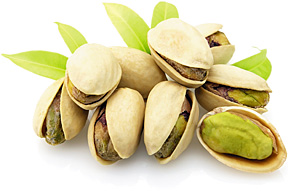The Power of Pistachios
One of Nature's Best Cholesterol Fighters
By Dr. Jacob Schor
They're small, green and are ideally eaten by hand, although you can also find them in salads, muffins, chicken and fish dishes, and even ice cream. Yes, we're talking about pistachios, and an increasing body of research asserts that these nuts are powerful allies in the fight against high cholesterol and atherosclerosis. Here's the latest news about pistachios and how they - and nuts in general - are an essential element of a healthy diet.
Pistachios and Cholesterol: The Penn State Studies
A few years back, a research team from Pennsylvania State University recruited 28 men and women with high cholesterol and fed them nuts; pistachios to be exact. How much? About an ounce serving (32 grams) either once a day or twice a day for a month. Levels of high-density lipoprotein ("good") and low-density lipoprotein ("bad") cholesterol were monitored carefully before and after the pistachio month.
The results were dramatic. Eating two servings of pistachios a day lowered total cholesterol by 8 percent and LDL cholesterol by almost 12 percent (p< 0.05). That little "p value" number in the parenthesis tells us how statistically significant the decreases in cholesterol are. P< 0.05 means decent odds that these findings aren't just random chance. The total cholesterol/HDL cholesterol ratio and the LDL cholesterol/HDL cholesterol ratio for this group of nut eaters dropped 8 percent and 11 percent, respectively (also p< 0.05). These were also positive findings, since in both cases, it meant a higher percentage of cholesterol was of the HDL variety, which has been shown to protect against the development of atherosclerosis.
 Two years went by and everyone thought the team had gone on to other things, but then out of the blue, one of the researchers showed up as lead author on another pistachio paper. Published in March 2010, the study revealed that eating pistachios also lowers levels of what is known as oxidized LDL.
Two years went by and everyone thought the team had gone on to other things, but then out of the blue, one of the researchers showed up as lead author on another pistachio paper. Published in March 2010, the study revealed that eating pistachios also lowers levels of what is known as oxidized LDL.
What is brilliant is that they skipped over the need to run a new clinical trial; they used their original pistachio trial, but analyzed the blood collected in it for different chemicals. We need to step back a moment to understand the elegance of this maneuver. Cholesterol levels are risk markers for heart disease risk. These days, pretty much everyone knows that high amounts of total cholesterol and LDL cholesterol raise the risk of atherosclerosis, which can lead to blocked arteries. High levels of HDL cholesterol are protective against developing atherosclerosis.
But it's not that simple. There is a step in the game that we hear little about in public yet. For the cholesterol and LDL to really lead to heart disease, it needs to oxidize, that is, go rancid. Once these fats are oxidized, then the plaques start to build up in the blood vessels, cutting off blood flow and leading to big problems. While high cholesterol and LDL levels are not good, high levels of oxidized LDL are the really bad news. Thus, the real challenge is not just lowering cholesterol anymore, but lowering blood lipid oxidation.
The most recent study showed pistachios can do just that. Eating pistachios lowered the amount of oxidized LDL in the blood. (It also improved the lipid numbers in general, but that wasn't as important as the fact that it reduced the amounts of oxidized blood fats.)

